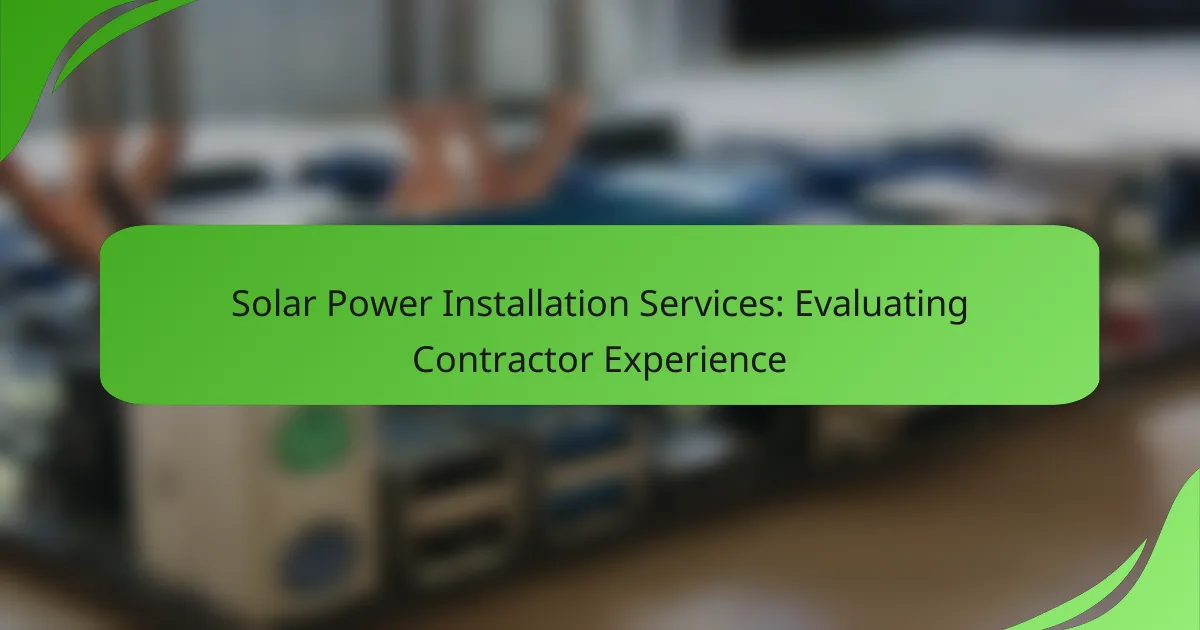When considering solar power installation services, it’s essential to evaluate the experience and qualifications of potential contractors. Key factors such as certifications, customer feedback, and a proven project history will guide you in making an informed choice. By focusing on these elements, you can ensure a successful installation and long-term satisfaction with your solar investment.
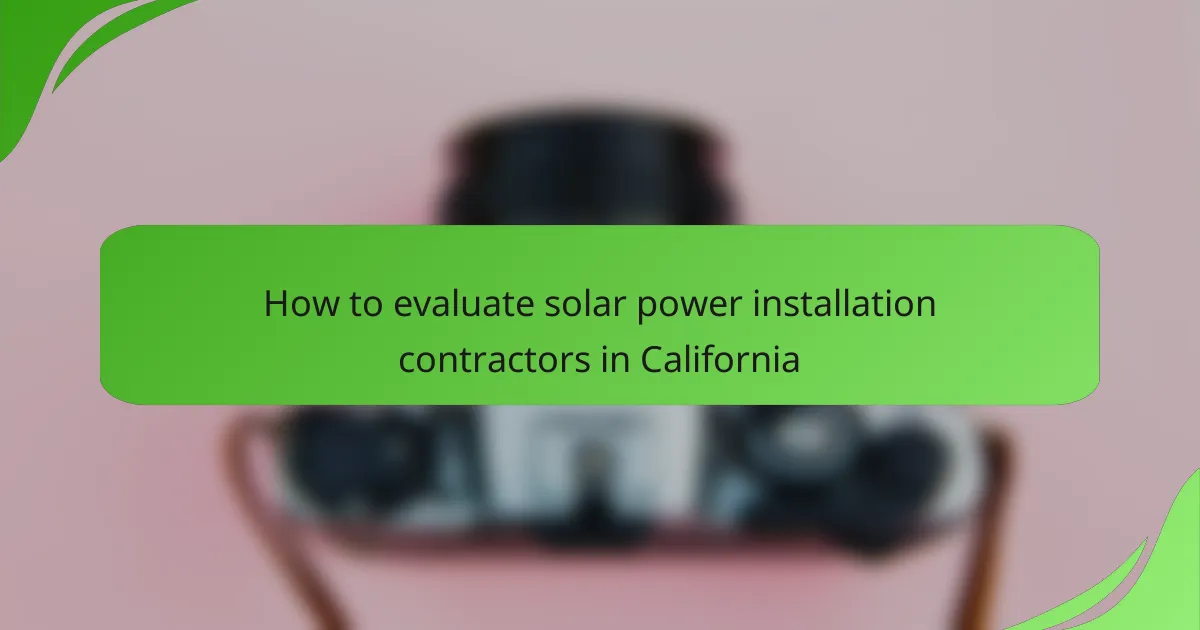
How to evaluate solar power installation contractors in California
Evaluating solar power installation contractors in California requires careful consideration of their experience, qualifications, and customer satisfaction. Focus on key factors such as certifications, customer feedback, project history, insurance, and warranty options to make an informed decision.
Check contractor certifications
Ensure that the contractor holds relevant certifications, such as those from the North American Board of Certified Energy Practitioners (NABCEP). These certifications indicate a level of expertise and adherence to industry standards, which is crucial for quality installation.
Additionally, verify if the contractor is licensed in California, as this is a legal requirement. A valid contractor’s license demonstrates compliance with state regulations and ensures that the contractor is qualified to perform solar installations.
Review customer testimonials
Customer testimonials provide insight into the contractor’s reliability and quality of work. Look for reviews on reputable platforms like Yelp, Google, or the Better Business Bureau to gauge overall satisfaction.
Pay attention to both positive and negative feedback. Positive reviews can highlight strengths, while negative ones may reveal potential red flags, such as poor communication or unfulfilled promises.
Assess project portfolio
A solid project portfolio showcases the contractor’s experience and capabilities. Review completed projects to see the types of installations they have handled and the scale of those projects.
Ask for case studies or references from similar projects in California. This can help you understand how the contractor adapts to local regulations and environmental conditions.
Verify insurance and bonding
Confirm that the contractor has adequate insurance coverage, including liability and worker’s compensation. This protects you from potential liabilities in case of accidents or damages during the installation process.
Additionally, check if the contractor is bonded. A bond ensures that the contractor will fulfill their contractual obligations and provides a financial safety net in case of disputes or incomplete work.
Compare warranty offerings
Warranties are crucial in evaluating solar power installation contractors. Compare the warranty terms offered by different contractors, focusing on both equipment and workmanship warranties.
Typically, equipment warranties range from 10 to 25 years, while workmanship warranties may last from 1 to 10 years. A longer warranty often indicates higher confidence in the quality of the installation and the materials used.

What experience should a solar power contractor have?
A qualified solar power contractor should have a solid track record, demonstrating years of experience and a portfolio of completed projects. Evaluating their expertise in various solar technologies and project types is crucial for ensuring a successful installation.
Minimum years in business
Look for contractors with at least 3 to 5 years in the solar power industry. This duration typically indicates a level of stability and experience in navigating local regulations and market conditions. Newer companies may lack the depth of knowledge required for complex installations.
Consider asking for references from past clients to gauge their satisfaction and the contractor’s reliability over time. A contractor with a longer history may also have more established relationships with suppliers, which can lead to better pricing and service.
Types of projects completed
Assess the variety of projects a contractor has completed, including residential, commercial, and industrial installations. Contractors who have worked on diverse projects are often better equipped to handle unique challenges and requirements. For instance, a contractor experienced in both rooftop and ground-mounted systems can provide tailored solutions based on your specific site conditions.
Request a portfolio or case studies that showcase their previous work. This will help you understand their capabilities and the scale of projects they are comfortable managing.
Specializations in solar technology
Contractors may specialize in different aspects of solar technology, such as photovoltaic (PV) systems, solar thermal systems, or battery storage solutions. Identifying a contractor’s specialization can help ensure they are well-versed in the latest advancements and best practices relevant to your project.
Inquire about any certifications or training they have received, such as NABCEP (North American Board of Certified Energy Practitioners) certification, which can indicate a commitment to quality and ongoing education in the field. This expertise can lead to more efficient installations and better long-term performance of your solar system.
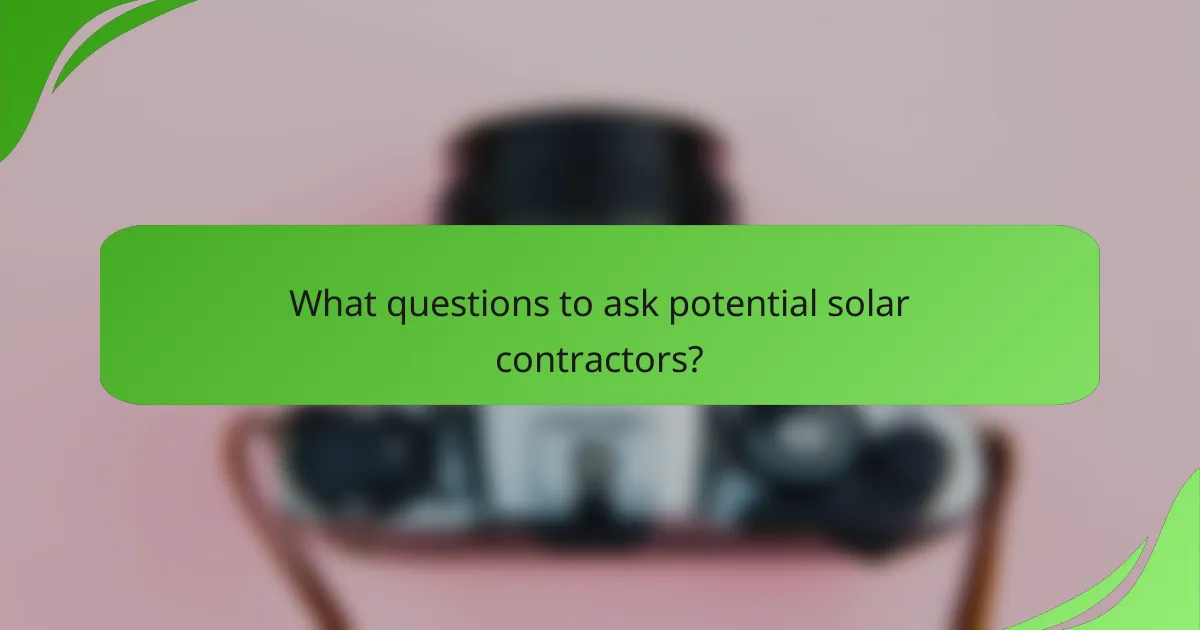
What questions to ask potential solar contractors?
When evaluating solar contractors, it’s crucial to ask specific questions that reveal their experience and reliability. This will help ensure you choose a contractor who can deliver quality installation and support.
Inquire about installation process
Understanding the installation process is essential for setting expectations. Ask the contractor to outline each step, from site assessment to final inspection, and how long each phase typically takes. A well-defined process indicates professionalism and preparedness.
Inquire about the types of solar panels and inverters they use, as well as their installation methods. This can affect both the efficiency of your system and the overall installation timeline.
Ask about financing options
Financing can significantly impact your solar investment. Discuss available options such as cash purchases, loans, leases, or power purchase agreements (PPAs). Each option has different implications for ownership, maintenance, and long-term savings.
Ensure you understand any associated fees, interest rates, and payment schedules. Some contractors may also offer incentives or rebates that can lower your initial costs, so ask about those as well.
Request maintenance plans
Maintenance is key to ensuring your solar system operates efficiently over its lifespan. Ask potential contractors about their maintenance plans, including what services are provided and how often they are performed. Regular maintenance can prevent costly repairs down the line.
Inquire whether they offer warranties or service agreements that cover parts and labor. A good maintenance plan can provide peace of mind and protect your investment in solar energy.
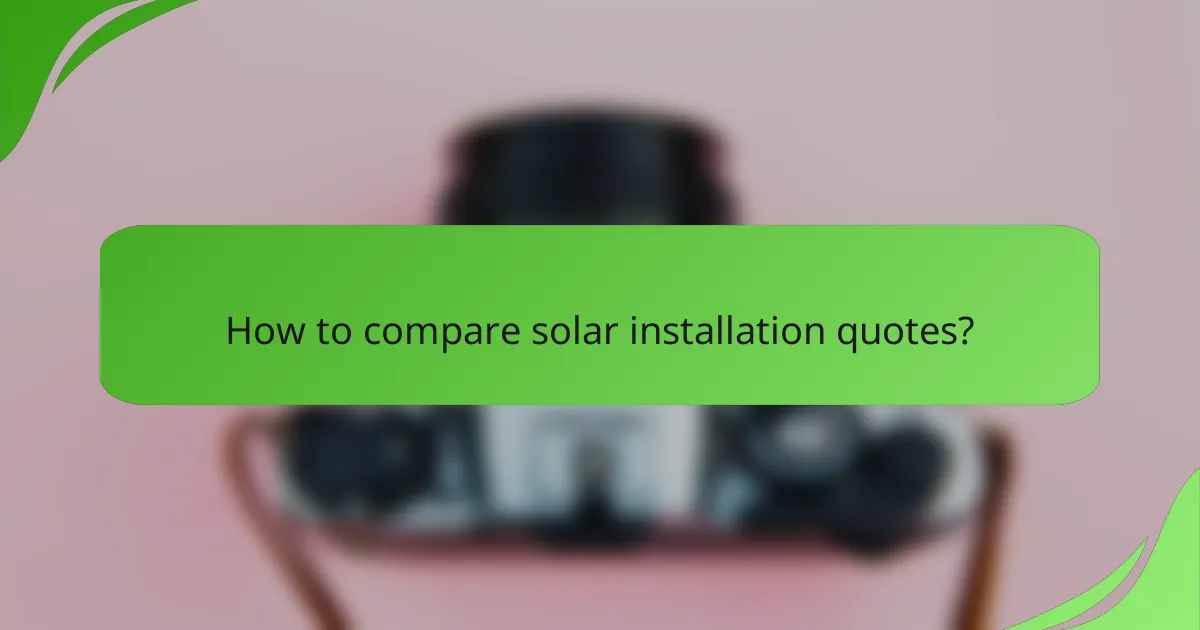
How to compare solar installation quotes?
To effectively compare solar installation quotes, focus on key factors such as cost per watt, included services, and financing terms. These elements will help you determine the best value and ensure you receive a comprehensive installation package.
Analyze cost per watt
Cost per watt is a crucial metric when evaluating solar installation quotes. It represents the total cost of the solar system divided by its total output capacity in watts. A lower cost per watt typically indicates a more competitive offer.
When comparing quotes, aim for a cost per watt in the range of $2.50 to $3.50 for residential installations in the U.S. This range can vary based on system size, location, and market conditions. Be cautious of extremely low bids, as they may indicate subpar equipment or services.
Evaluate included services
Included services can significantly impact the overall value of a solar installation quote. Look for offers that encompass not just the installation but also design, permitting, and post-installation support. Comprehensive packages can save you time and additional costs down the line.
Common services to check for include site assessments, system monitoring, and warranties. Ensure that the quote specifies the duration and coverage of warranties, as these can vary widely among contractors.
Consider financing terms
Financing terms are essential to understand when comparing solar installation quotes. Different contractors may offer various payment options, including cash purchases, loans, leases, or power purchase agreements (PPAs). Each option has its pros and cons, affecting your overall investment.
Look for financing with favorable interest rates and terms that fit your budget. For instance, a loan with a low interest rate can make solar more affordable over time, while a lease might offer lower upfront costs but could limit your ownership benefits. Always read the fine print to avoid hidden fees or unfavorable conditions.
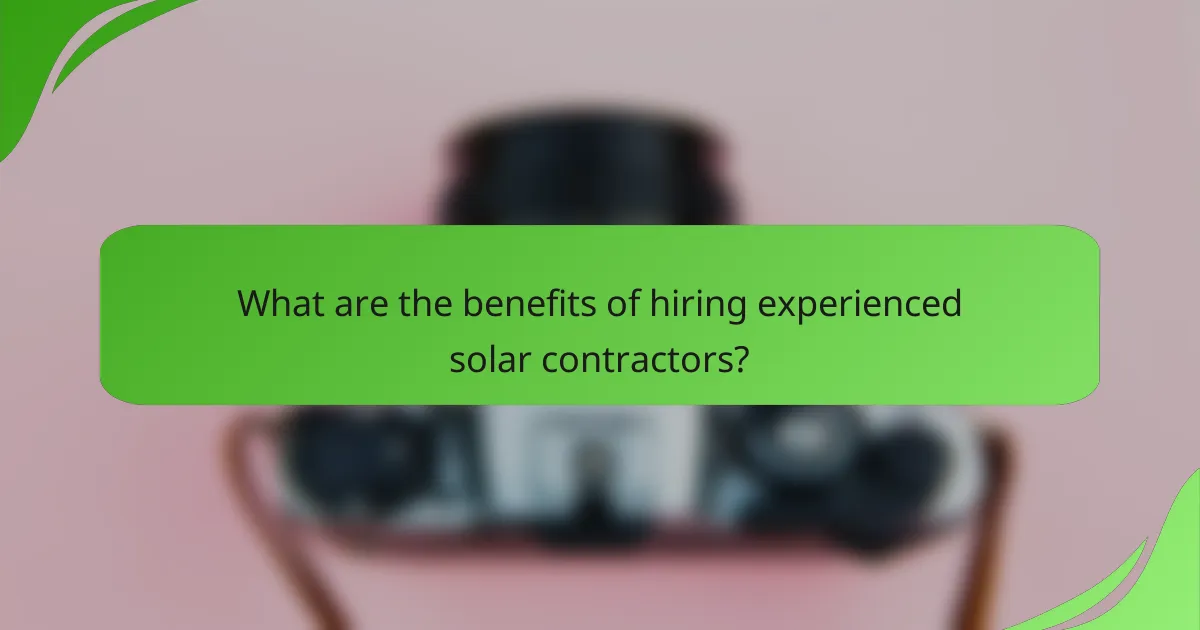
What are the benefits of hiring experienced solar contractors?
Hiring experienced solar contractors can significantly enhance the quality and efficiency of your solar power installation. Their expertise ensures compliance with local regulations, optimal system design, and reliable performance, ultimately leading to better long-term savings and satisfaction.
Quality of Work
Experienced solar contractors are more likely to deliver high-quality installations due to their extensive knowledge and skills. They understand the nuances of different solar technologies and can tailor systems to meet specific needs, ensuring optimal energy production.
Additionally, their familiarity with local building codes and regulations helps avoid costly mistakes. This reduces the risk of future issues, such as system failures or legal complications, which can arise from improper installations.
Cost Efficiency
While hiring experienced contractors may seem more expensive upfront, their expertise often leads to cost savings in the long run. They can recommend the most efficient systems and installation methods, which can lower energy bills and maintenance costs.
Moreover, experienced contractors are typically better at securing permits and incentives, which can further reduce overall expenses. For instance, they might help you navigate federal or state tax credits, which can significantly offset installation costs.
Customer Support and Warranty
Established solar contractors usually offer robust customer support and warranties, providing peace of mind for homeowners. Their experience often translates into better after-sales service, ensuring that any issues are addressed promptly and effectively.
When selecting a contractor, inquire about their warranty policies. A solid warranty can cover equipment and workmanship, protecting your investment over time. Look for contractors who offer warranties of at least 10 years for installation and 25 years for solar panels.
